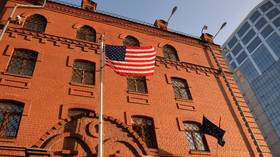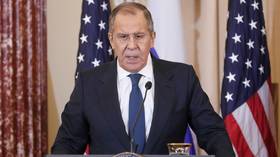American analysts downbeat as Washington chooses to withdraw its diplomatic presence in Siberia & Russia’s remote Far East

As Russia moves to liberalize its Visa system for most Western visitors, the US has said it will close its last consulates outside Moscow. This step is certain to reduce person-to-person contacts between Americans and Russians.
The decision, which has echoes of the Cold War. albeit with roles reversed in terms of the paranoia at play, will see diplomatic offices close in the Far Eastern capital Vladivostok, and in Ekaterinburg, Russia’s fourth largest city, located east of the Ural Mountains. President Donald Trump’s administration notified Congress of the plans over a week ago, but the news received little coverage until Saturday.
While the exact timings of the closures have not yet been made clear, it is understood that American officials will be transferred to the country’s embassy in Moscow, while local Russian support staff will be laid off. In news that will satisfy Washington’s deficit hawks, the State Department predicts that the move, if made permanent, would save $3.2 million each year.
Also on rt.com ‘We need more public diplomacy, not less’: ex-Ambassador McFaul ‘saddened’ by US closing last two regional consulates in RussiaIn a written communiqué, the administration claims that its actions are “in response to ongoing staffing challenges of the US Mission in Russia in the wake of the 2017 Russian-imposed personnel cap on the US Mission and resultant impasse with Russia over diplomatic visas.” The presence of state representatives first became an issue in 2016, when Washington expelled 35 of Moscow’s diplomats, limiting its mission’s numbers, over alleged attempts to interfere with that year’s Presidential elections, which Russia strenuously denies.
The decision leaves the US without formal representation anywhere apart from the capital, in a country that bridges two continents. As well as providing consular services to the more than a quarter of a million Americans who visit Russia each year, the offices are charged with issuing visas to Russians wishing to travel stateside.
Residents of Russia’s Far East who wish to visit the US will now have to fly for up to nine hours to Moscow for a Visa, with no guarantees that their application will be approved. Likewise, Americans needing to access consular services will face days of travel if they need support in Siberia or the Far East. The move, and the restrictive Visa regime, flies in the face of Russia’s recent policy towards liberalizing the process, with the introduction of a digital system offering tourists stays of up to 16-days for no more than $50 to be rolled out in January 2021. Americans are excluded from the scheme, but citizens of most NATO states are eligible.
Also on rt.com Move over Russia! Chinese Caribbean phone spying story gives hint of what’s to come under Biden administrationMany analysts took to Twitter to criticize the American decision, even those usually supportive of a more confrontational approach to relations with Russia. One-time US Ambassador Michael McFaul, who has frequently become the target of ridicule over his bellicose and often inaccurate claims about the country, said that he was “saddened” by the decision, adding that “the US should be seeking ways to engage more directly with Russian society.”
A senior national security adviser to the University of Denver’s Biden Institute, Sam Vinograd, was similarly concerned over the impact of the closures, adding that “there’s a reason we have embassies and consulates in countries. Closing consulates could harm Americans and our interests.”
Amazing how this 'new Cold War' is like the old one, in reverse. US tries to limit personal contacts between Russians & Americans, while Moscow makes it easy for Westerners to visit.US restricts Russian media, while Russia lets American journalists work relatively easily. https://t.co/UbuxsBGHBO
— Bryan MacDonald (@27khv) December 19, 2020
While ties between Moscow and Washington have been consistently under strain over a number of issues in recent months, it is unclear how the decision to shutter diplomatic offices is expected to relieve tensions. In most cases, consulates fulfil a purely administrative role, but they often also act as hubs for cultural and political exchanges, hosting events and enabling diplomats to get a better understanding of a country beyond its capital. Shuttering them also deprives the US of a useful vantage point in Vladivostok, in close range of China, North Korea and Japan.
In 2018, US officials forced Moscow to shut its consulate in Seattle, leaving it without any representation on America’s West Coast. In retaliation, the Kremlin told Washington to shut down its equivalent operations in the city of St Petersburg, one of Russia’s most popular tourist destinations. The spat saw around 60 diplomats expelled from the country, with Deputy Foreign Minister Sergey Ryabkov saying at the time that they had been ”declared ‘persona non grata’ for activities incompatible with diplomatic status.”
These decisions have widely been interpreted as attempts to restrict the kind of human-to-human contact that helps challenge established narratives about countries. In the Soviet-era, access to the country for foreign visitors was tightly restricted. But now, it would appear that the situation has reversed and, if a new Cold War is indeed underway, the US has chosen to close its doors to many Russians.
Think your friends would be interested? Share this story!













